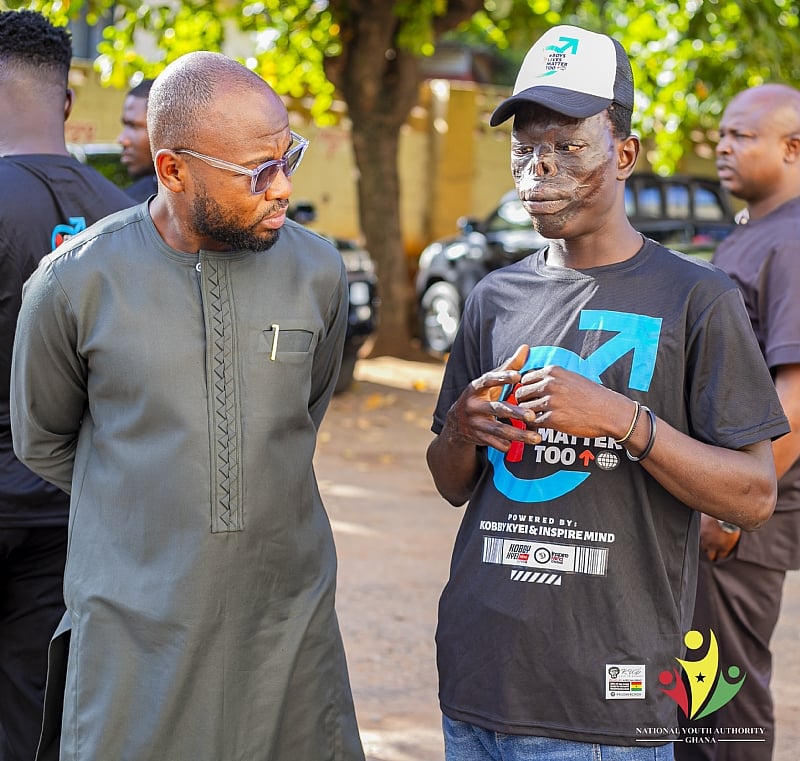Solomon Akugru’s journey from the depths of despair to the cusp of a brighter future exemplifies the transformative power of compassion, social responsibility, and effective governance. A survivor of the devastating June 3 Circle disaster, Akugru endured horrific facial injuries and the subsequent abandonment by his family, forcing him to resort to begging on the streets for survival. This tragic circumstance, however, caught the attention of Ghanaian blogger Kobby Kyei, whose “Touching Lives” initiative shines a light on the plight of vulnerable individuals across the nation. Kyei’s post on May 30, 2025, detailing Akugru’s story, resonated deeply with the public and crucially reached the desk of Mr. Osman Ayariga, the Chief Executive Officer of the National Youth Authority (NYA).
Mr. Ayariga’s response was not merely sympathetic; it was action-oriented and deeply personal. Recognizing Akugru’s resilience and his desire to rebuild his life through learning a trade, specifically tiling, Mr. Ayariga extended a personal invitation to Akugru to the NYA Head Office. This meeting was not a perfunctory bureaucratic exercise, but rather a genuine interaction fueled by empathy and a commitment to tangible assistance. Mr. Ayariga not only listened to Akugru’s aspirations but also personally facilitated his enrollment into the National Apprenticeship Programme, effectively paving the way for Akugru to acquire valuable skills and secure a dignified livelihood.
The swift and decisive action taken by Mr. Ayariga garnered widespread praise, particularly from Kobby Kyei, who publicly commended the NYA CEO for his hands-on approach. Kyei emphasized the significance of Mr. Ayariga’s personal involvement, highlighting that it transcended mere administrative duty and reflected a genuine commitment to empowering vulnerable youth. By personally completing the enrollment forms for Akugru, Mr. Ayariga demonstrated that true leadership involves not just directing from afar, but actively engaging with and supporting those in need. This personalized approach, coupled with the NYA’s broader commitment to youth development, has positioned Akugru on a path toward self-sufficiency and a future filled with hope.
The collaboration between Kobby Kyei and Mr. Ayariga showcases the synergistic potential of civic engagement and responsive governance. Kyei’s advocacy brought Akugru’s story to the forefront, while Mr. Ayariga’s proactive leadership ensured that this awareness translated into concrete action. This partnership exemplifies how public figures and government officials can work together to address pressing social issues and uplift marginalized communities. The impact of their combined efforts extends beyond Akugru’s individual case, serving as a powerful testament to the importance of inclusive leadership and the tangible difference it can make in the lives of those who need it most.
Furthermore, the story of Solomon Akugru serves as a poignant reminder of the long-lasting impact of tragedies like the June 3 Circle disaster. While immediate relief efforts are crucial in the aftermath of such events, the long-term recovery and rehabilitation of survivors often require sustained support and tailored interventions. Akugru’s case highlights the need for continuous efforts to identify and address the ongoing challenges faced by survivors, ensuring that they are not forgotten or left to fend for themselves. His journey emphasizes the importance of creating social safety nets and providing opportunities for survivors to regain their footing and rebuild their lives with dignity.
The resounding positive response to Mr. Ayariga’s initiative underscores the public’s appreciation for impactful governance and genuine social intervention. It reinforces the pivotal role of institutions like the NYA in transforming lives and empowering the youth, particularly those from disadvantaged backgrounds. The story of Solomon Akugru, amplified by Kobby Kyei’s platform, has sparked a wave of hope and inspired countless individuals across the nation. It stands as a testament to the potential for positive change when individuals, organizations, and government agencies work together with a shared purpose. The ripple effect of this collective effort will undoubtedly continue to inspire acts of kindness and social responsibility, creating a more inclusive and supportive society for all Ghanaians.


